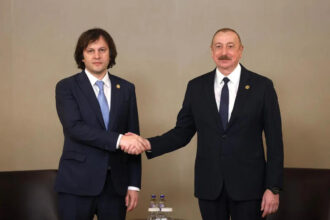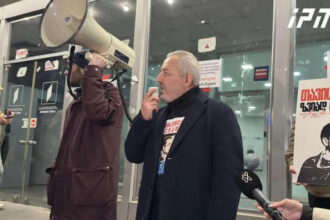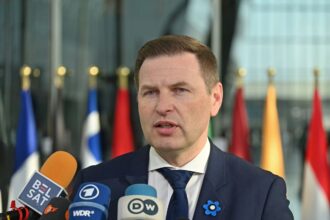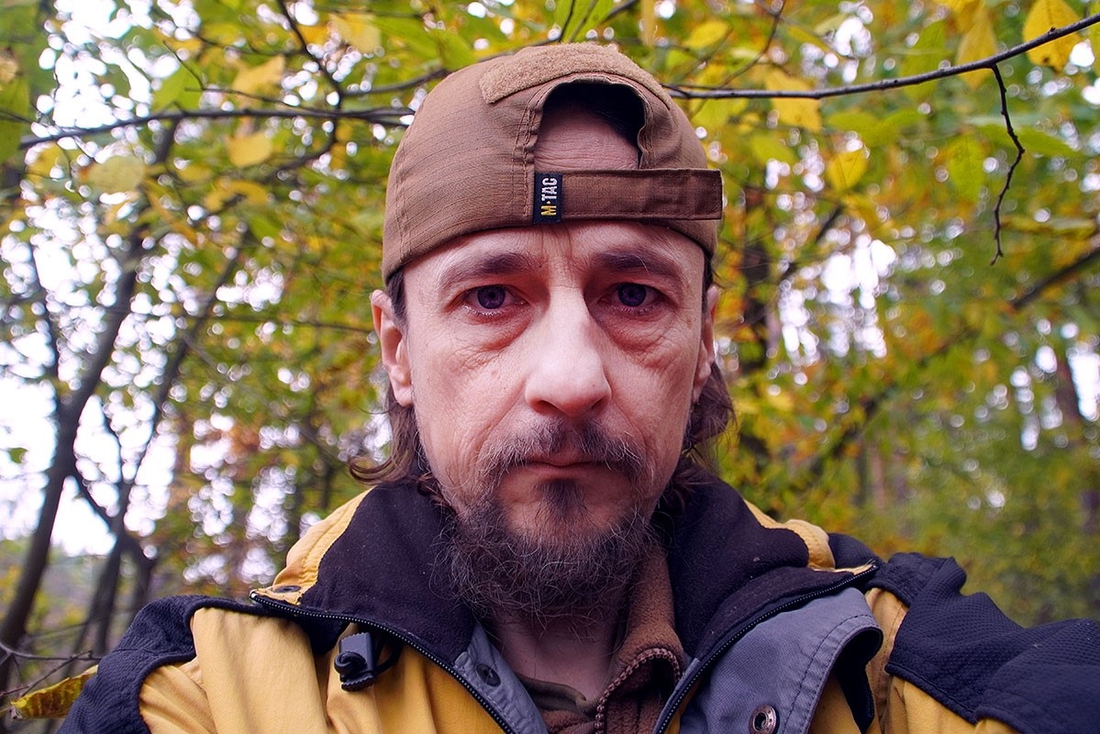Roman Chornomaz, a dissident descendant who fought against Russian forces near Bakhmut, died fighting Russian forces decades after the KGB had dragged away his defiant dad just days before he planned to marry.
Roman Chornomaz (alias “Corsair”), a Ukrainian sniper and Maidan activist who was also a photojournalist, died on 13 June 2023 near Bakhmut.
Roman was the third-generation of his family to fight against Russian imperialism. He died fighting for his right to live free in Ukraine, unlike his grandfather and father who were only sentenced to prison.
Roman Chornomaz participated actively in the 2014 Euromaidan Revolution. On 20 February 2014 he was in the forefront of vul. Instytutska where he documented the shootings of unarmed protesters in the riot police under the pro-Russian president Viktor Yanukovych.
Roman joined the army in 2022 despite having serious health issues. He defended Ukraine for more than a year as a sniper in the Svoboda Battalion, Rubizh Rapid Reaction Brigade, of Ukraine’s National Guard. He fought in fierce battles at Sievierodonetsk and Bakhmut.
Dissidence and civic activism: A family tradition
Roman Chornomaz was born on 11 May 1976, in Uman, Cherkasy Oblast. He comes from a patriotic family of dissidents and intelligentsia.
His grandfather was a Ukrainian Insurgent Army member who fought for an independent Ukraine and was imprisoned by Polish, German and Soviet rule. His great-grandfather was a priest who was executed by the Bolsheviks on July 31, 1937.
Roman’s father Bohdan, was a lifelong activist and dissident who, in Soviet times, worked together with Viacheslav, a nationalist-democratic leader, to achieve Ukraine’s independence, after spending 17 years as a prisoner of the Soviet Union.
He was arrested two days before his marriage in 1972 on charges of Ukrainian nationalism and anti-Soviet propagandist.
The formal reason for his arrest was the reproduction and dissemination of Ivan Dziuba’s banned book “Internationalism or Russification”, which challenged the Soviet Union’s eradication national identity by transforming Soviet citizens into Russians.
“My father set up a large reception tent in the village. He also slaughtered two pigs and salted an entire barrel of fish. Everything was prepared for the wedding. Bohdan, the groom, was arrested two days prior to the wedding. In those days we didn’t have mobile phones, so everyone came to the wedding, including the musicians. The wedding was held without the groom. In an interview with Hromadske, Tetiana Roman’s mother says that the KGB told her to tell everyone that he had been in an accident.
Bohdan Chrnomaz spent three years in the harshest Soviet prison camps in Siberia. He was rehabilitated and became an historian who researched Ukraine’s national freedom movement under Soviet rule.
Tetiana, Roman’s mother is a well-known volunteer and public figure. She was the editor of the first anti-communist uncensored newspaper “Chervona Kalyna”, and a journalist at Radio Liberty.
“My son was a normal boy from a normal family. He may have had parents who were not so ordinary, but they decided that the most important thing in life was to defend, fight for, and to have our own country. There was nothing Soviet about our home. My parents did not send me to kindergarten and neither did I send Roman or Sofiya. Tetiana says, “I didn’t want my children to learn about Ded Moroz or Lenin’s poems.
Roman’s sister, Sofiya Chornomaz-Lytvynenko, recalls that their parents always took them to pro-Ukrainian rallies and protests. The children held banners and flags because at that time the police were not allowed attack children.
Roman Chornomaz, a Ukrainian language and literature teacher, spent the majority of his career as a photojournalist. His work was widely published in Ukrainian and foreign media. He lived and worked for a while in Kyiv, before returning to Uman where he continued his career as a freelancer, farmer and experimented with new crop production techniques.
“I thought that 40 was the perfect age to settle into a more relaxed lifestyle, in contrast to my previous one. In an interview, Roman revealed that he was a photojournalist who traveled around the country constantly. He visited all district centers and oblasts, as well as many villages. “But the war wouldn’t let me sit still.”
Roman, who jokingly called himself “a shaggy haired guy that likes to go to festivals to take photos,” was actually a complex, intelligent and profound figure who combined classical liberal ideas with nationalist ones.
He also advocated the establishment of a Orthodox Church independent from Moscow, as well as the restoration of the rights of the Ukrainian Language, which had been suppressed by Russian linguistic repression for centuries.
The Call of Maidan
Roman Chornomaz, an active participant in the Euromaidan Revolution that saw Ukrainians revolting against the then-president Yanukovych for reneging on the pro-EU promise under Moscow’s pressure, took part in clashes between the Berkut riot officers.
Roman, on his Facebook page, called on Ukrainians to stand up and fight repression after the bloody crackdown of 18 February when government snipers killed dozens unarmed protesters.
“I’m now in Kyiv after walking along the Maidan Frontlines. I can’t find the right words to describe my experience. This is beyond words. It’s all messed up. Either we or they are to blame. Come to Kyiv! Break through the roadblocks to get here! The Maidan is crowded and will hopefully remain that way until morning. I’m tired, so I will sleep for a few hours at a safe house. But God save us! If you go back to work tomorrow, as if nothing happened, you’re slaves. You are stupid robots and blind horse.”
Euromaidan photos by Roman Chornomaz
Roman was in central Kyiv on 20 February 2014 to document the shooting of unarmed demonstrators as well as the heroics of Euromaidan activists who risked their lives to save wounded comrades.
Photographer-turned-sniper deploys to eastern Ukraine
Roman, despite his serious health issues, volunteered to join the army when Russia launched its full scale invasion in February 2022. Roman could have left the country, but he chose to stay.
“Sitting at home, reading the news, and feeling constantly afraid is not an option,” he said. “You could say that [resisting- Ed] is in our blood,” said he.
As a member the Svoboda Battalion, Rubizh Rapid Response Brigade, in the Ukrainian National Guard, he defended Ukraine for more than a year on the frontlines, enduring fierce combat in Sievierodonetsk, Zaitseve, and Bakhmut.
In January 2023 he was injured in combat near Bakhmut. He was hit in the arm with shrapnel and had additional contusions.
Roman’s natural aptitude for sniping led him to choose this specialty. He raised money to buy his equipment and sniper weapon, which he called “Witch,” after completing rigorous training.
“It turned out that this job is perfect for me, and I learned it quickly. I am a photographer and understand optics. I remember physics and can understand bullet flight paths and ballistics. There are many nuances that you need to learn. But with motivation and skills you can master any subject.”
He said that snipering is an intellectual job that requires precise calculations. A sniper should be able observe, create firing maps and identify enemy positions. Snipers have a mix of a commander and infantryman. They are also at great risk. In many cases, the enemy would cover an entire area in Grad rockets to try and take out a single sniper.
Roman’s sister Sofiya says that Roman was patient and focused. As his company commander stated, he was not hot-headed, but rather cold and calculated. He was very calm and collected.
Roman stressed the importance of combat troops learning useful skills beyond basic shooting.
“Machine Gunners alone aren’t enough.” We need more to keep the enemy at a distance – mortar crews and artillery, tankers and drone operators, drivers, specialists who can cause real damage.”
Roman gained combat experience at Sievierodonetsk. He endured heavy fighting and constant massive bombardment. He and his comrades in arms held an entire building for one month, where each morning an enemy tank would arrive to destroy parts of it. The ten-story building was almost completely destroyed when the Ukrainian unit retreated.
“I thought I would take a lot of photos and video from the front but, frankly, there is almost no time or effort for that. There is constant shelling. I have to run to a firing post and shoot back. You can’t stop filming when the enemy is attacking, even if you wanted to. When things calm down, all you want to do is sleep, eat and rest,” he told Svoboda Weekly.
Death in the suburbs of Bakhmut
Roman was eager to learn new skills at military facilities. His unit moved to Bakhmut in late 2022.
“The first thing I was surprised by is how freely they walked through the fields and along the tree line near Bakhmut. I watched them with my thermal vision and went to work. After a few days, they learned to hide.”
In February 2023 he wrote: “The last three months at Bakhmut ground zero have been damn hard. Cold, damp, fog and snow, mud. This is the real enemy, and it’s what wears down your morale and physical strength. I’ll hate blackened dead sunflowers and planted fields for the rest my life. There were too many people that I knew who died in those fields. It makes me sick to hear people say that their losses were small. There is no such thing as a small loss. “Every death is beyond measure.”
In a video with NV he continued to discuss his thoughts on war: “I used think that hell should stink like sulfur. Not at all. It smells like burning objects, scorched building, and live fire. “That’s the smell from hell.”
Roman Chornomaz was killed on 13 June 2023, when an enemy missile hit the armored vehicle that was transporting his unit in Bakhmut. The evacuation of his body from the battle field took two days. The family had to wait for two months before they received the results of the DNA tests. Roman was buried in the Alley of Heroes of Sofiyivska Slobidka Cemetery, Uman, Cherkasy Oblast on 31 August 2023.
Tetiana Chornomaz says that nothing or no one can break the spirit of her son… and this is also true for Ukrainian defenders today.
“I am proud of my son’s spirit and his desire to defend his country and go to war. We don’t wish to be different, we simply want to be Ukrainian. When my son died, I sat and thought, “My Roman gave his own life so that I can live here in my home, so I don’t have wander around train stations of Warsaw, Prague, or other countries.” This is my home.”
Read More @ euromaidanpress.com













